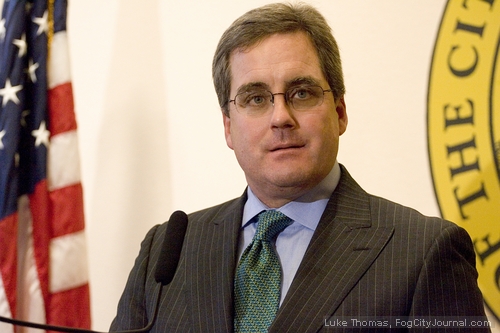City Attorney pledges full support of his office to audit and pursue termination of City contracts with Arizona governments, businesses.

San Francisco City Attorney Dennis Herrera
From the Office of San Francisco City Attorney Dennis Herrera
April 26, 2010
City Attorney Dennis Herrera today called upon City policymakers to adopt and implement a sweeping boycott of the State of Arizona and Arizona-based businesses in the wake of a draconian new anti-immigration measure signed into law by Arizona Gov. Jan Brewer on Friday. Citing San Francisco’s moral leadership against such past injustices as South African apartheid, the exploitation of migrant farm workers, the economic oppression of Catholics in Northern Ireland, and discrimination against the LGBT community, Herrera offered the services of his office’s contracts, government litigation and investigations teams to work closely with City departments and commissions to identify applicable contracts and to aggressively pursue termination wherever legally tenable. Herrera also offered the assistance of his office’s attorneys in any legal challenges to the Arizona law.
Arizona’s controversial new law makes it a state-level crime for someone to be in the country illegally, and even criminalizes the failure to carry immigration documents at all times by lawful foreign residents. It additionally imposes a requirement for police officers to question those they suspect may be in the United States illegally. Civil libertarians have sharply criticized the law for being an open invitation for harassment and discrimination against all Latinos, regardless of their citizenship. It has also been rebuked by the nation’s law enforcement community, with the president of the Major Cities Chiefs Association, San Jose Police Chief Robert Davis, reiterating his organization’s 2006 policy statement that requiring local police to enforce immigration laws “would likely negatively effect and undermine the level of trust and cooperation between local police and immigrant communities.”
“Arizona has charted an ominous legal course that puts extremist politics before public safety, and betrays our most deeply-held American values,” said Herrera, who is himself the son of an immigrant from Latin America. “Just as it did two decades ago when it refused to observe Martin Luther King Jr. Day, Arizona has again chosen to isolate itself from the rest of the nation. Our most appropriate response is to assure that their isolation is tangible rather than merely symbolic. San Francisco should lead the way in adopting and aggressively pursuing a sweeping boycott of Arizona and Arizona-based businesses until this unjust law is repealed or invalidated. My office is fully committed to work with San Francisco city departments and commissions to identify all applicable contracts, and to pursue termination wherever possible. And my office stands ready to assist in any legal challenges in whatever way it can.”


 The Hunger Site
The Hunger Site
April 26, 2010 at 1:12 pm
Will Arizona’ s draconian law spark Congress to act on immigration reform? I doubt it. I don’t think they have the stomach for tackling the difficult job of comprehensive immigration reform, including a way for the undocumented immigrants to become legal. .
For years, a majority of lawmakers in Congress have said the border needs to be secure before they will consider immigration reform. In March, the Department of Homeland Security’s plan to build a virtual fence across the U.S.-Mexico border ended just before the release of a report by a Government Accountability Office report slamming the system. Clearly, virtual fencing or real fencing may slow, but not completely stop, people from trying to cross the border for jobs. The failure of fencing may be used as an excuse not to act.
As I see it, immigration reform is not necessarily a Republican vs. Democrat issue or a conservative vs. liberal issue. Even Latinos are divided with some saying, “we had to work hard to get here, and did it legally,” while others saying, ” it’s okay because everybody does it.” And it is not necessarily a U.S.-Mexico issue either. Many non-Mexican immigrants from Latin America call themselves Mexican; otherwise they would be deported across several borders to their own countries. (Note that Mexico’s immigration policy is more severe than ours, because of the “drug wars” and U.S. pressure from the U.S., and its own xenophobia toward other Central American countries.)
Finally, immigration reform is at least tangentially related to the drug problem. U.S. law enforcement officials have identified at least 230 U.S. cities, including Anchorage, Atlanta, and Boston, where Mexican drug cartels or their affiliates maintain drug distribution networks or supply drugs to distributors. And border states like Arizona have suffered a rise in drug-related crime attributed to the Mexican drug cartels. Marijuana is the largest cash crop in the U.S, more valuable than corn and wheat combined, and many of the marijuana plantations run by drug cartels are hidden in our federal and state parklands.
I bet Congress may decide to wait until Arizona’s law makes its way through the courts, which will take immigration reform well past mid-term elections.